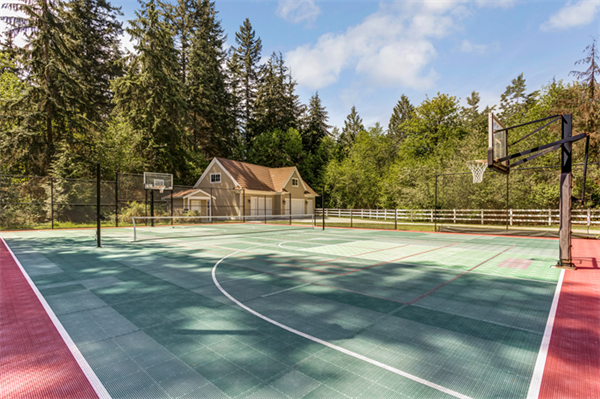How to Choose the Right Surface for Your Backyard Sport Court

Building a backyard sports court is an investment into your home, health, and family. From neighborhood tournaments to extra exercise, backyard sports courts are perfect. If you’ve made the decision to build a backyard sports court, then you should protect your investment by choosing quality materials, including the surface material.
While concrete or asphalt might sound like good ideas, there are better court surface materials out there to research. C&C Courts has done some of the work for you and put together a guide to help you choose the right surface for your backyard sports court.
Types of Surface Materials
First, let’s take a look at the different surface material options for backyard sports courts. These surface types are available almost anywhere, but they require different maintenance and have different costs. The most popular sport court flooring materials include:
Durability
One of the primary considerations when choosing surface materials is durability. Since your court is outdoors, you need something that can withstand Wisconsin weather, which includes hot summer days and freezing cold winters. Without proper durability, you will spend more money repairing or replacing your court surface.
Concrete
Concrete is highly durable and is a great choice for backyard sports courts. It can withstand extreme weather and heavy use. It can provide a consistent, smooth surface and is customizable. However, some cons of concrete include the hard surface that can cause injury, potential for cracking under pressure and weather changes, and the higher cost for installation.
Asphalt
Asphalt is more affordable than concrete, but lacks durability. Asphalt can be affected by extreme temperatures and weather conditions in Wisconsin, and it needs to be resealed every few years to maintain its condition. Hairline cracks can form because of asphalt’s low density, causing court failure.
Plastic Modular Tiles
Plastic modular tiles are another option for outdoor sports courts. C&C Courts’ special PowerGame, PowerGame+, and SportGamePB surface materials are made from polypropylene copolymer–in other words, a kind of plastic. It’s lightweight, durable, and resistant to cracks, chemicals, corrosion, and stains. These surface materials excel in durability and come with a long warranty. Even if a tile does become damaged, replacing it is much easier than other surface materials.
Maintenance Considerations
Adding a backyard sport court includes spending time and money maintaining the court surface to keep it perfect for playing. You will need to ensure you have the time and energy to properly maintain your court so it does not deteriorate.
Concrete
Concrete is generally low maintenance, though it does require some. You will need to keep the surface clear and clean as decaying organic material, such as leaves, can damage the surface. Powerwashing your court every once in a while can help remove mildew and dirt build up. Just keep in mind that concrete can crack if it is not reinforced with rebar.
Asphalt
Asphalt, while cheaper than concrete, requires more maintenance. Some of the general tasks you will need to perform include: regular cleaning, mopping up spills and stains immediately, sealing the court every few years, fixing cracks, checking drains for clogs or blockages, and resurfacing the court when necessary. In this case, you must consider whether the lower cost outweighs the maintenance requirements.
Plastic Modular Tiles
Plastic modular tiles require some maintenance, but will fare better during the winter months than other surface materials. You will need to keep the surface clean to avoid build up of dirt and leaves, check for damage occasionally, and avoid using de-icer on the surface. De-icer can corrode the surface of your court, so wait for your court to thaw before playing sports in the winter.
Suitability for Different Sports
Something else to consider when choosing a surface material for your sports court is how suitable it is for the sports you want to play. Different materials work better for different sports, so let’s look at how these three types stack up.
Concrete
Concrete can work for a variety of sports, including:
-
Basketball
-
Tennis
-
Pickleball
-
Volleyball
-
Badminton
The problem with concrete is that it is unforgiving if you fall. Concrete can cause broken bones if you fall hard enough, along with scrapes and cuts. If you choose concrete, make sure you wear appropriate footwear and avoid playing when the surface is wet or icy.
Asphalt
Asphalt is a popular choice for:
-
Basketball
-
Tennis
-
Pickleball
-
Multi-use courts
Asphalt is a little more forgiving than concrete but can still cause injury, so always be careful when playing.
Plastic Modular Tiles
The plastic modular tiles that C&C Courts loves to install are perfect for many sports, including:
SportGamePB, PowerGame, and PowerGame+ all come with a patented LateralForgiveness technology, which helps absorb shock away from your body. These tiles also have low skin abrasion, which means you will not get hurt as badly if you fall.
Let C&C Courts Help You Pick Out Sports Court Surface Materials
At C&C Courts, we are passionate about our sports courts, and we want you to feel the same way. That’s why we only use the highest quality materials. We have vetted and tested our signature court surface materials to ensure they are perfect for Wisconsin sports courts. With our help, you can have your dream sports court with the perfect flooring.
Choose C&C Courts to build your backyard sports court. Give us a call today at 414-377-5294 or request a quote online!